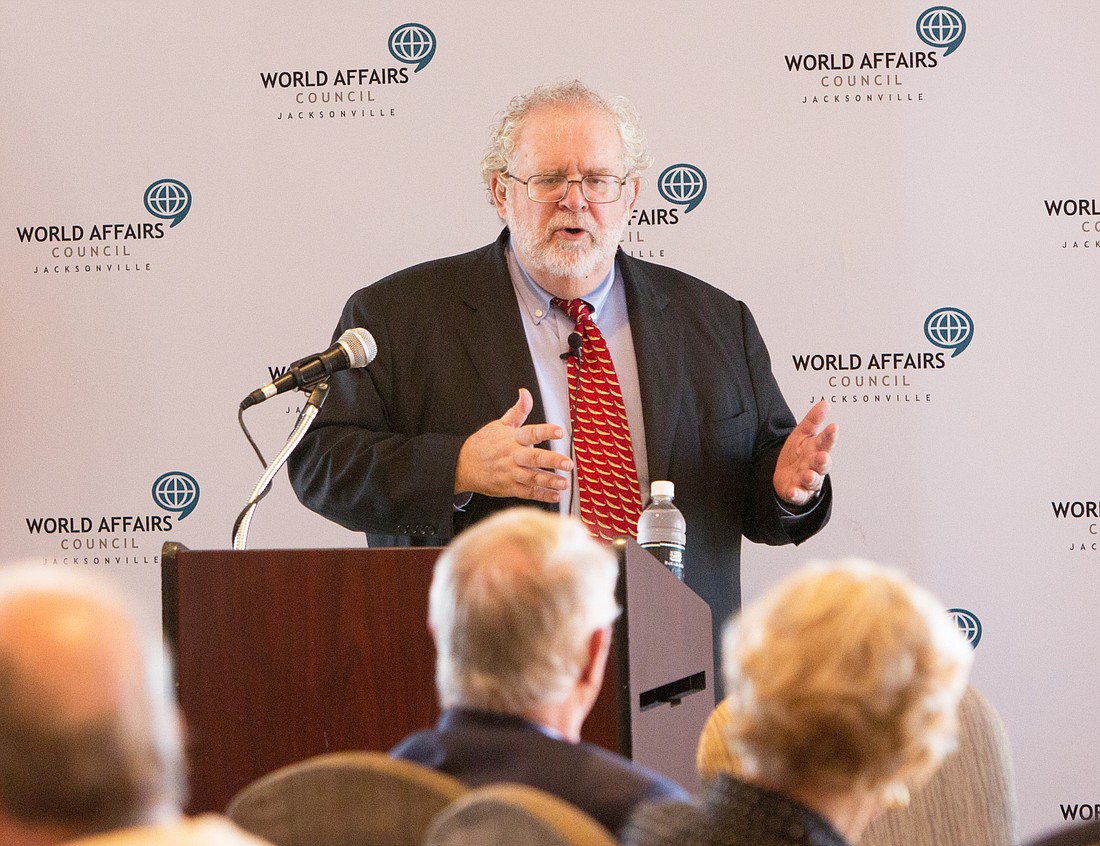
The pros and cons of protectionism in U.S. trade policy are a hot topic now in Washington, D.C., but it’s an issue with a long and complicated history, Walter Russell Mead said Tuesday.
“When you look at it from an economic history perspective, protectionism is bad; free trade is good,” Mead said during a luncheon talk to the World Affairs Council of Jacksonville.
However, many countries have benefited from protectionist policies over the past two centuries, said the professor of foreign affairs and the humanities at Bard College and The Wall Street Journal global affairs columnist.
“I’m kind of stuck here,” he said during the event at The River Club Downtown.
“Protectionism may be problematic. But there are clearly times when people have used it and benefited from it.”
For example, protectionist policies helped the United Kingdom become an economic power in the 1800s and helped the U.S. become the dominant business power in the first half of the 20th century, Mead said.
He compared protectionism with chemotherapy, which is a poison to cancer cells.
Protectionism is “a poison, yes, but sometimes the uses of it outweigh the disadvantages,” he said.
The World Trade Organization may be associated with free trade but it also includes elements of protectionism, Mead said. One way it promotes protectionist policies is excluding agriculture from its trade rules.
“Protection of farmers is one of the most powerful political forces that exist,” Mead said.
Countries that have suffered from food shortages, especially during and after wars, promote protectionist agriculture rules to ensure their people have food security.
“They’re willing to pay an economic price to have enough food,” Mead said.
“It’s very hard to argue that from a pure economic policy perspective,” he said. But, “you end up with real distortions in the markets.”
The U.S., in the aftermath of the Great Depression and World War II, loosened its trade policies to allow American businesses to sell goods overseas.
“We weren’t going to get those markets unless we opened up our own markets,” Mead said.
“We let the Europeans have higher protections on their goods than we placed on them.”
The U.S. was willing to do that because it needed vibrant markets to sell goods.
“You can’t get rich selling to a poor man,” Mead said.
During the Cold War, the U.S. also was promoting capitalism to developing countries, hoping that free trade policies would prevent them from aligning with communism, he said.
“It had the effect we were looking for. The Third World developed rapidly,” he said.
Now those smaller countries and large ones like China have developed their economies with the help of lenient U.S. trade policies.
“The Trump argument is, OK, that time is over,” Mead said.
Mead cited a story about Abraham Lincoln meeting future wife Mary Todd and telling her he wanted to dance with her in the “worst way.”
President Donald Trump may be dancing through trade negotiations in the worst way, Mead said, but “I actually think it’s a dance that needs to happen.”
Mead doesn’t have answers himself on how to resolve trade disputes with the world.
“The answers are going to have be worked out by a lot of people,” he said.